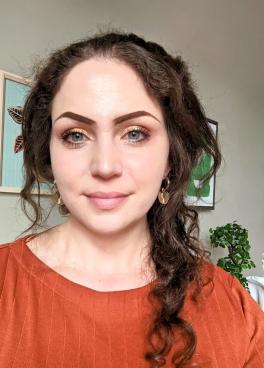Anna-Maria Senuysal

Affiliation: The Ohio State University
Keywords: Liminal Matter - Material Ecocriticism - Ecocentrism
Anna-Maria Senuysal received her dual PhD from the dual PhD program at the Universities of Cincinnati and Duisburg-Essen in the summer of 2024 before joining the Umwelt Center at Ohio State as a Postdoctoral Scholar.
Her research is broadly situated at the intersection of German Studies and Anthropocene Studies, Material Ecocriticism, and Postcolonial Studies. Her monograph-in-progress, Liminal Matter: Of Mushrooms, Stones, and Stars, offers a material-ecocritical critique of Enlightenment thought in light of the Anthropocenic crisis. Each of the book’s three chapters engages with a material interlocutor – rocks, fungi, and stars – as theoretical objects as well as their appearances in German-speaking art, film and literature from the late-eighteenth to the twenty-first century, and ultimately conceives them as instigators for non-anthropocentric, relational modes of worldmaking. In her work, she engages cultural productions from the German-speaking world (ranging from Johann Wolfgang von Goethe to Ursula Biemann) in dialog with contemporary theorists like Leo Bersani, Karen Barad and Elizabeth Povinelli. She is also working on a second larger project about decay as generative principle, tentatively titled After Form. Decomposition, Disorder, and the Aesthetics of Emergence.
Anna has particular interest in all things fungi and has worked about the Third Kingdom from theoretical and aesthetic perspectives, including forthcoming publications on 'fungal poetics' in Judith Schalansky's An Inventory of Losses and "Fungal Ontology / After Enlightenment: Boundary-Making after Critique". She is also interested in migratory and postcolonial perspectives and has worked on Ursula Biemann's and Milo Rau's engagements with global challenges. She is co-editor of the first comprehensive volume on Rau, The Theater of Milo Rau: Aesthetics - Ethics - Politics (co-edited with Tanja Nusser, Teresa Kovacs, and Nicole Rizzo, Fink 2025).
